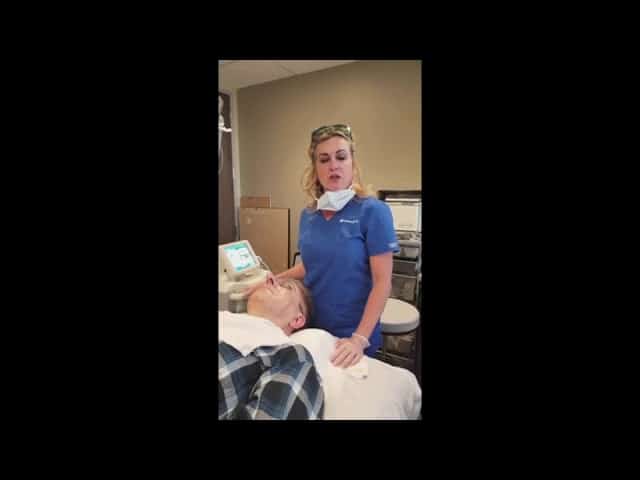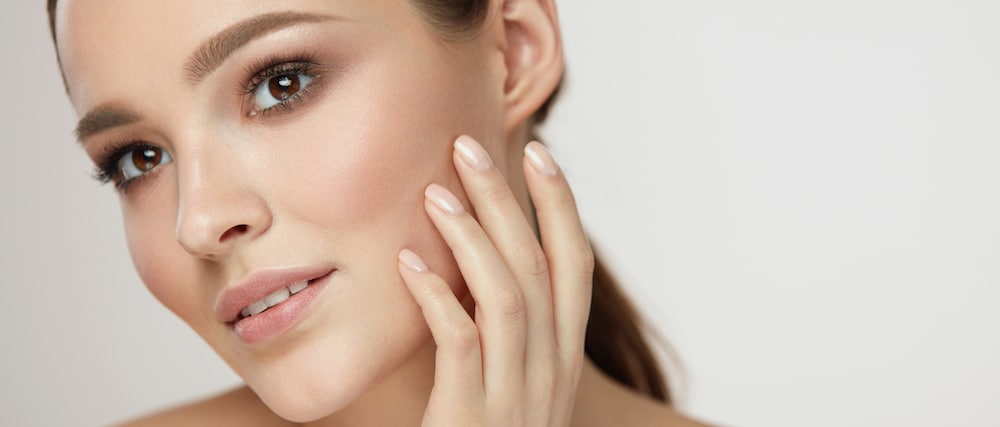Laser Resurfacing (Skin Rejuvenation)
Many of the primary signs of aging occur in the uppermost layers of the dermis and epidermis. Fine lines, wrinkles, skin laxity, and age spots can negatively affect how you feel about your appearance, and these are concerns that are most easily addressed with in-office treatments, rather than facial cosmetic surgery. In our Denver office, we have many options to improve the clarity of the skin. After a careful consultation with our experts, many people elect to move forward with treatment of multiple signs of aging simultaneously using laser resurfacing.
What is Laser Skin Resurfacing?
Laser resurfacing treatments remove damaged skin and rejuvenate a patient’s appearance. State-of-the-art laser treatments can provide remarkable results even on the most environmentally damaged and discolored skin. In more mild cases, light chemical peels can tighten wrinkles, lighten age spots, and soften skin texture around the eyes. In addition, laser treatments or chemical peels are often combined with Botox and fillers to optimize your appearance without surgery.

You may decide to discuss a deeper laser treatment with Dr. Fante, or you may choose to look at other great laser options available at ReDerm MD Medical Spa.
What is Laser Skin Resurfacing Used to Treat?
We use a variety of lasers and other light-based therapies to address skin texture and color changes including:
- Patches of brown pigmentation
- Broken blood vessels and visible capillaries
- Large pore size
- Fine wrinkles
- Deeper wrinkles and creases
- Unwanted hair
- Melasma
- Acne Rosacea
- Scars from adolescent acne
Dr. Fante’s First Halo Treatment for Brown Spots and Pigmentation

What Areas Can Laser Skin Resurfacing Target?
Laser resurfacing is typically conducted on parts of the face, or the entire face. However, it may also be possible to utilize various laser devices to reduce signs of sun damage on the neck, chest, hands, and forearms. Laser resurfacing tends to be more effective for lighter-skinned people with light hair and light eyes who usually have more obvious sun damage than dark-skinned people. Variations in technique can also be utilized for people with darker skin, and our staff has special expertise to help in those situations.
Fractional Laser Vs. Complete Laser
Laser resurfacing can be accomplished with many different kinds of lasers that use different wavelengths for different purposes, as well as different intensities for different skin types and ages. In addition, laser energy can be applied to the facial skin in limited fractions that treat a small percentage of the surface area using a grid pattern, or the laser energy can be applied to the entire surface of the skin. Fractional laser usually has a faster recovery but is less dramatic in its effects, while Complete laser takes longer to heal but can provide a more complete improvement.
Can Laser Skin Resurfacing Be Combined With Other Treatments?
Laser skin resurfacing is often combined with surgical facial procedures such as blepharoplasty and facelift surgery. After the tissue has healed completely, patients may also schedule injectable treatments to further enhance their youthful appearance.
How to Prepare for Laser Skin Resurfacing
As with all facial plastic surgery, good health and realistic expectations are desirable.
- A complete medical history will be taken. Be sure to tell our staff if you have any allergies.
- Our staff will explain the techniques they’ll use, and the anesthesia, and the risks involved.
- Our doctors and staff will give you guidelines on eating and drinking, as well as smoking, and any vitamins, herbs, and medications you should take or avoid.
- Depending on your skin type and the procedure(s) selected, pre-treatment of your skin with medications such as tretinoin or hydroquinone may be recommended. Oral medications may also be prescribed, possibly including anti-viral prophylaxis, pain medication, and antibiotics.
The Laser Resurfacing Procedure
In general, laser resurfacing procedures will take from about 30 minutes to 90 minutes, using local anesthetic combined with some form of sedative. Depending on the type of laser used, your eyes and teeth may be protected with special devices. Depending on your exact situation, surgery may be appropriately performed in our office or in an ambulatory surgery center.
There are many procedures to choose from, and yours will be customized by Dr. Fante for your unique face.
You’ll be very pleased with your new, refreshed look. Dr. Fante are always available to answer questions and provide support.
Watch Dr. Fante’s Journey With Bbl & Halo Laser Resurfacing

Who Is A Candidate For Laser Skin Resurfacing?
Ideal candidates for laser skin resurfacing are adults who have fine lines, wrinkles, hyperpigmentation, blemishes, and texture on their face. The best skin types for this treatment are non-oily and medium- to light-colored skin. While having a darker skin tone may not disqualify you from becoming a laser skin resurfacing candidate, it may increase your risk of scarring from this procedure. Patients with slightly loose skin can also benefit from the tightening effects of this treatment.
While laser skin resurfacing can improve the appearance of acne scarring, patients with active acne cannot undergo laser treatment until their acne is healed. Laser skin resurfacing will not eliminate excessive skin, sagging skin, or deep wrinkles. If you are pregnant or planning to become pregnant, laser treatment is not recommended until after childbirth.
Is Laser Skin Resurfacing Painful?
For most patients, laser skin resurfacing is a quick process that only involves a slight, stinging or snapping sensation, similar to a rubberband hitting skin. Many do not consider the laser treatment to be overly painful. However, numbing medication can be applied to the treatment area before your procedure if needed. For patients with large treatment areas, sedation before treatment may be administered so that nothing is felt at all during the laser skin resurfacing treatment.
How Does Laser Resurfacing Compare to Microneedling?
Both laser resurfacing and microneedling are beneficial for skin rejuvenation. However, they work on completely different levels. Laser utilizes light energies to target specific aspects of the skin, such as pigment. Laser treatment may also be ablative in nature, vaporizing tissue on contact. Microneedling affects the skin in a mechanical fashion, creating thousands of tiny channels in the epidermis. These channels provoke an increase in collagen production to rebuild the skin’s foundation over time. In general, laser skin resurfacing will achieve a more obvious change in the appearance of the skin, but will take longer to heal.
How Often Should I Get Treatment?
You can get laser skin resurfacing treatment done once every four weeks. Some patients will need multiple treatments in order to achieve their desired results. Once you achieve your desired look, a good skincare routine and protection from the sun will ensure an improved complexion. We recommend getting laser skin resurfacing once a year to maintain your results.
How Long Do The Results From Laser Skin Resurfacing Last?
Your results from laser skin resurfacing can last several years with the proper sun protection and a great skincare regimen. While most patients will see immediate improvement in their skin after healing from their laser skin resurfacing treatment, your skin’s appearance may continue to improve for up to a year.
Laser Skin Resurfacing Aftercare
After treatment, you can go home, though you’ll need someone to drive you if you’ve taken any sedatives. There’ll be ointment temporarily blurring your vision and you’ll have a prescription for an oral pain reliever if you need it. There’ll be some swelling and bruising which you can minimize with an ice pack. Herbal and homeopathic medicines can sometimes also help with bruising and you will be given information on which ones to consider.
Skincare after laser resurfacing may depend somewhat on the type of laser used and the extent of ablation to the uppermost layers of tissue. Some of the general guidelines most patients can expect include applying an appropriate moisturizer while the skin heals and applying ice packs or cold compresses as needed to manage swelling and comfort. Patients may also perform vinegar soak treatments at home, applying a cloth soaked in one tablespoon of white vinegar diluted in water for a few minutes, a few times each day. This remedy may promote faster healing during the first few days after resurfacing.
Our staff discusses post-treatment instructions before laser resurfacing and provides clear written details that patients can take home. We are also available by phone to answer any questions that arise after laser skin resurfacing.
How Soon After Laser Skin Resurfacing Can I Wear Makeup?
It may be possible to apply makeup as soon as the day of treatment depending on the extent of tissue ablation performed in the office. When deeper layers of tissue have been affected by laser treatment, healing may involve redness and peeling that require gentler care and avoidance of certain chemicals. Once you have decided on the laser treatment you wish to undergo, we can provide you with detailed instructions about cleansing, moisturizing, and makeup.

Can Resurfacing Be Used to Improve Scarring?
Laser skin resurfacing may be a nice follow-up to a surgical procedure conducted to rejuvenate the face. Scar improvement is one of many reasons that treatment may be performed. Depending on your skin and the type of surgery you have had, we can discuss the ways in which laser skin resurfacing can enhance your results.
Potential Side Effects of Laser Resurfacing
The most common side effects of laser skin resurfacing include redness, itching, and swelling. The degree to which these side effects occur depends on the intensity of the laser treatment conducted. Although not as common, an acne breakout or infection may occur after laser skin resurfacing. Burns and other complications such as infection and loss or gain of pigmentation are rare. Risks are mitigated by choosing a trained, licensed professional to conduct laser resurfacing treatments.
Read What Our Patients Are Saying!
"Dr. Eshalier is great, although she was 1/2 hour late to the party. Better than Dr. Fante, who was over an hour late last time. No explanations or apologies ever. I've been a patient of Fante for years, and they do a great job except for that."
Click here to read more reviews.
Schedule a Consultation
If you are interested in laser skin resurfacing, contact our Denver office today! Call 303-839-1616 to schedule a consultation with our surgeons Dr. Robert Fante.


